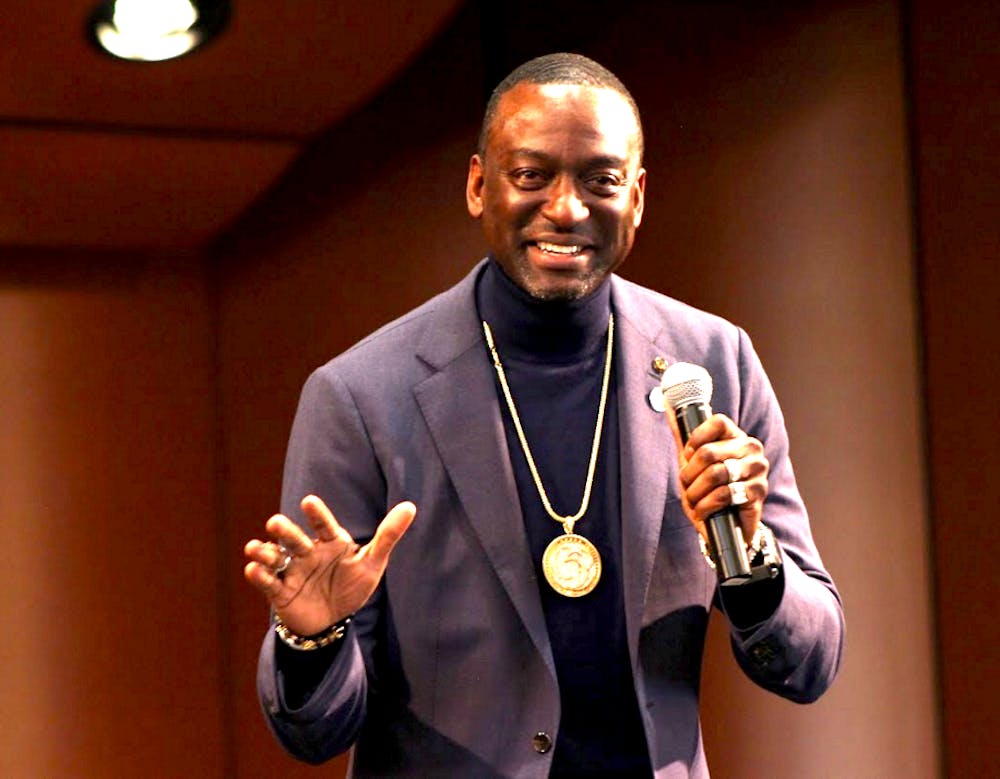By Camille Furst
Managing Editor
“Guilty” rang in the room like a deafening cymbal, overpowering shrieks and screams of shock. The word was said over and over again — so many times that Yusef lost count. Before this, he was certain the truth would be revealed and he would be found innocent. He was certain he would finally be free.
Instead, the then-16-year-old was told to stand and place his hands behind his back. He was handcuffed and immediately placed into custody — into what he called the “belly of the beast.”
“All of a sudden, you find your whole life interrupted,” he said. “And there, we cried.”
Salaam was one of the Central Park Five: the group of five boys — four African-Americans and one Latino — who were found guilty of raping Trisha Meili, a young woman jogging in Central Park. She was found so badly beaten early in the morning on April 20, 1989, that she would remain in a coma for weeks to follow, having no memory of being attacked.
Antron McCray, Korey Wise, Kevin Richardson, Raymond Santana and Salaam all faced sentences ranging from five to 15 years in prison before they would be exonerated by DNA evidence and later named the Exonerated Five. It would be 30 years after his wrongful conviction when Salaam visited Kendall Hall on Nov. 20 to tell his story of long-awaited justice and redemption.
“It is an honor and privilege to host him here today,” said Ivonne Cruz, the College’s interim vice president of Institutional Diversity, Equity, and Inclusion.
To tell his story, he started from the beginning — when the judge provided his sentencing, and asked Salaam if he had anything to say beforehand. While Salaam’s family and friends advised him to “throw (himself) on the mercy of the court,” he did the opposite.

“I’m not gonna sit here at your table and watch you eat, and call myself dinner,” he said to the judge. “Sitting here at your table doesn’t make me dinner, just like being here in America doesn’t make me an American.”
Salaam then recounted the anger the judge had for him afterward, and that the only way to understand the anger was to go back in time — to the 13th Amendment of the U.S. Constitution. Under the amendment, all citizens are declared free from slavery with the exception of due punishment for crimes.
Many opponents of the principle, including Salaam himself, believe that the stipulation in the amendment allows for continued oppression against African-Americans in the form of mass incarceration.
“They can turn them back into slavery under the punishment of crime,” he said. “I was the 1,113th person to enter (the prison) … and it was only February.”
Unlike the experiences of other members of the Exonerated Five who spent time in prison, many of the other inmates who surrounded Salaam knew he was innocent — some even looked to him as a leader. He turned to drawing, meditation and prayer for his livelihood while incarcerated. He told The Signal of his growing interest in learning about different worldviews at the time, and how would he read the Quran and the Bible during his incarceration.
“Most of it was trying to remain mentally free, even though my body was in bondage,” he told The Signal.
During his speech at Kendall Hall, he elaborated on his position as a Muslim looking back on his experience. He said he felt he had to go through the false conviction and wrongful imprisonment in order to help others and create change today. He described the Central Park Jogger case as a “love story between God and his people.”

“It’s a story about a people who can be brought low only to rise, because the truth can never stay buried,” Salaam said. “Instead of a social death, we emerge from the ashes like the phoenix. Because as they built the fire to consume us, they forgot about the owner of the heat.”
During the Q&A session after his speech, Shad Yasin, a senior biology major, was able to address Salaam.
“I think your story is extremely inspirational,” he said.
In an interview with The Signal, Salaam elaborated on his reaction to seeing “When They See Us,” the Netflix miniseries about him and the other four members of the Exonerated Five.
Despite his physical bondage for years, the process of producing and seeing the final product “was one of the most powerful, liberating experiences you can imagine.”
But what he cherished the most was the title — he told The Signal that it reflected the opportunity for the public to see them for who they really are.
“Those layers behind the curtain begin to peel back, and you begin to see a person and say ‘wow, I can finally see,’” he said. “‘I can finally understand.’”







